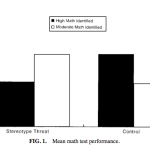gender
In archaeology, we distinguish osteological sex from artefact gender. Osteo-sex is with very few exceptions (odd chromosomal setups) the same thing as what your genitals are like. Artefact gender is the material correlate of a role you play according to the conventions of your time: e.g. whether you keep your genitals in Y-fronts or lacy knickers. We judge these two parameters from separate source materials. Your skeleton can't tell us anything about your gender, and your grave goods can't tell us anything about your osteo-sex. They are in principle able to vary independently.
Nevertheless,…
Cousin E pointed out something odd about the International Mathematical Olympiad. It's an annual competition for high school students. And girls do super poorly in it. We ran some stats on the data for 2015 and 2016, and found that a national team with more than one female member gets less than half the median points per capita of an all-male team. With one female member, it's 59-78%.
The question I want to address is not whether women are in empirical fact worse at maths than men. Nor do I, if this is the case, want to discuss whether it's because of nature or nurture. I want to…
Warm weather at the Winter Olympics played a major part in the $51 billion extravaganza. Greg Laden calls the Sochi games more of a "Fall Olympics" as competitors bit the slush on the slopes and the half pipe. At the Extreme Park, casualties among women outnumbered casualties among men by nearly 3 to 1. Why the gender imbalance? Greg wonders if the men's and women's courses are not suitably dimorphic, or if better training would make a difference. On The Pump Handle, Celeste Monforton takes the panoptic view with the official Olympic injury and illness surveillance system. During the last…
I was just digitally flipping through a new book called "Crime Against Nature", which describes various reproductive behaviors in the animal kingdom. It is written by an artist, Gwenn Seemel, not a scientist, so I cannot vouch for the scientific accuracy of the book as a whole. However, the illustrations are quite nice and the content is seemingly scandalous, which makes for an interesting read.
For example, did you know that male Dayak fruit bats can lactate to feed their young (True according to this article in Nature)?
Image from "Crime Against Nature",…
Humans appear to have a great deal of variation in sexual orientation, in what is often referred to as "gender" and in adult behavior generally. When convenient, people will point to "genes" as the "cause" of any particular subset of this diversity (or all of it). When convenient, people will point to "culture" as the "cause" of ... whatever. The "real" story is more complicated, less clear, and very interesting. And, starting now, I promise to stop using so many "scare" quotes.
Fixed up and reposted.
Prior to birth there are a number of factors than can influence things like gender or…
I don't think I really recognized how much stuff I've avoided dealing with by only having boys until I read _Cinderella Ate My Daughter_ by Peggy Orenstein. You see, despite the fact that I joke about living in the testosterone house, or being the only female in a house of guys (until C. and K. recently returned to their family, there were 8 males and me - now we're down to a mellow six males), my boys are growing up in a household without much in the way of rigid gender roles, or their toys. Given the combination of no girls and no tv, I am only vaguely aware of phenomena…
There are two recent studies of gender disparities in science and technology (referred to by the faintly awful acronym "STEM") getting a lot of play over the last few days. As is often the case with social-science results, the data they have aren't quite the data you would really like to have, and I think it's worth poking at them a little, not to deny the validity of the results, but to point out the inherent limitations of the process.
The first is a study of lifetime earnings in various fields that includes this graph showing that women with a Ph.D. earn about the same amount as men with a…
Humans appear to have a reasonable amount of diversity in their sexual orientations, in what is often referred to as "gender" and in adult behavior generally. When convenient, people will point to "genes" as the "cause" of any particular subset of th is diversity (or all of it). When convenient, people will point to "culture" as the "cause" of ... whatever. The "real" story is more complicated, less clear, and very interesting. And, starting now, I promise to stop using so many "scare" quotes.
Prior to birth there are a number of factors than can influence things like gender or sexuality…
It's been an exciting week for me. On Monday I successfully defended my thesis! Now that I have established my scientific credibility to you all, here is a picture of me at my defense party wearing my "Trust me I'm a Dr" Dr. Pepper t-shirt and hitting my SpongeBob SquarePants piñata.
And on Tuesday I went to two really interesting events/talks/discussions about science and scientists. First up was Debbie Chachra's awesome seminar "Unpacking Gender: Men and Women in Science, Technology, and More," sponsored by the Harvard Graduate Women in Science and Engineering. She described her seminar…
Today is the 100th Anniversary of International Women's Day, founded to celebrate the achievements of women. Founded in Europe to advocate for greater participation of women in the public sphere, International Women's Day focuses heavily on those public sphere accomplishments of women - as political leaders, in education, in activism. Those are important and powerful things, the more important because most of us still have visceral memory of women's past. Consider this Guardian interview with women talking about what has changed in their lifetimes.
At the same time that we speak about the…
LOOK at the photograph on the right. Does it show the face of a man or a woman? There's no right answer - the photo has been manipulated to look sexually ambiguous and can be perceived as either. But according to a recent study published in the journal Psychological Science, the sense of touch can influence how you perceive and categorize the face.
Last year a team of European psychologists found that bodily movements alter the recollection of emotional memories, and an American group showed that the sense of touch influences social judgements and decisions. The new study adds to the growing…
I had a great conversation with Maggie Koerth-Baker from BoingBoing for bloggingheads.tv Science Saturday. We talked about all sorts of sciency stuff, including her upcoming book on the challenges of renewable energy, synthetic biology, the similarities between cheese and the human body, women in science/blogging, and octopus brains. I had a lot of fun chatting with Maggie and I learned a lot, and I hope you will too!
Scientists aren't known for their fashion sense, but they do have their own unique charm, as you can see in this episode of In The Lab, with Bill Cunningham.
All the science blogs are talking about it. Where are all the female science bloggers? The question itself and the long lists of great bloggers who happen to be female bring up a lot of interesting questions about what makes a good blog, what is best for blog (self-)promotion, who is in what science blogging clique, what it means to write about "women's issues," and what it means to be a woman in science. But what these lists (and the blogs that they're on) highlight even more is just how homogeneous the community can be: Where are the non-white science bloggers? Where are the LGBTIQ science…
In yesterday's post about the experience of science, I mentioned that I had both a specific complaint about the article by Alexandra Jellicoe (which I explained in the post) and a general complaint about the class in which the article falls. I want to attempt to explain the latter problem, partly because I think it will be useful, but mostly because it's stuck in my head, and I need to at least type out the explanation before I can move on to other things.
The article in question doesn't contain all of the elements I'll mention below, but I think it clearly falls into a class of articles that…
Over at Inside Higher Ed, there's a list of "survival tips" for women entering grad school in the sciences. It's a pretty good and pretty typical list of advice-- you can find more or less the same advice posted somewhere every fall.
What's striking about it, though, is that if you stripped all the specific gender references out, it would still be a good list of advice, for students of either gender. Here's the list with gender-specific terms removed:
Be realistic about support from faculty. As a general matter, faculty of either gender want to see their students of either gender succeed.…
GOOD has an interesting series of articles called No More Dirty Looks about the cosmetics that we use every day and what options are available for safer, more environmentally sound beauty products, without any toxic carcinogens, endocrine disruptors, or petrochemicals. Yesterday they linked to a terrifying video from The Story of Stuff Project describing the limits of regulation on toxic chemicals used in everyday products from lipstick to baby shampoo:
The best line of the video I think comes in about halfway through, when talking about hair relaxers and skin whiteners advertised to young…
In the recent articles, blog posts, and comment threads about possible biological reasons for the continued gender disparity in tenured math and science faculty positions, the discussion seems to be divided between two groups: those who emphasize the social and cultural aspects involved in gender and intelligence, and those who emphasize the scientific evidence of standardized test performance. The science team rails against "political correctness," claiming that by questioning the merits and motives of scientific hypotheses of differences in innate intelligence between different groups of…
Another day, another article about how women are biologically inferior to men when it comes to high-level math and science. The fact that this one comes from the New York Times Science section, a newspaper I typically respect very highly, is all the more tragic and frustrating. I don't have time today to write with as much depth and ferocity as I would like to, but I want to just say that I find it outrageous that the New York Times would publish something so obviously sexist and one-sided about such a complex, nuanced, and important topic under the headline "Daring to Discuss Women in…
I love this quote from the XKCD blog:
The role of gender in society is the most complicated thing I've ever spent a lot of time learning about, and I've spent a lot of time learning about quantum mechanics.
Many scientists try very hard to de-emphasize this complexity, trying to reduce "human nature" down to parts and genes and behaviors that can be explained by evolutionary mechanisms, by hormones, by genetics. It's not nature vs. nurture and it's not just male and female, it's nature and nurture and infinite variations along a culturally and biologically mediated gender continuum. By…




